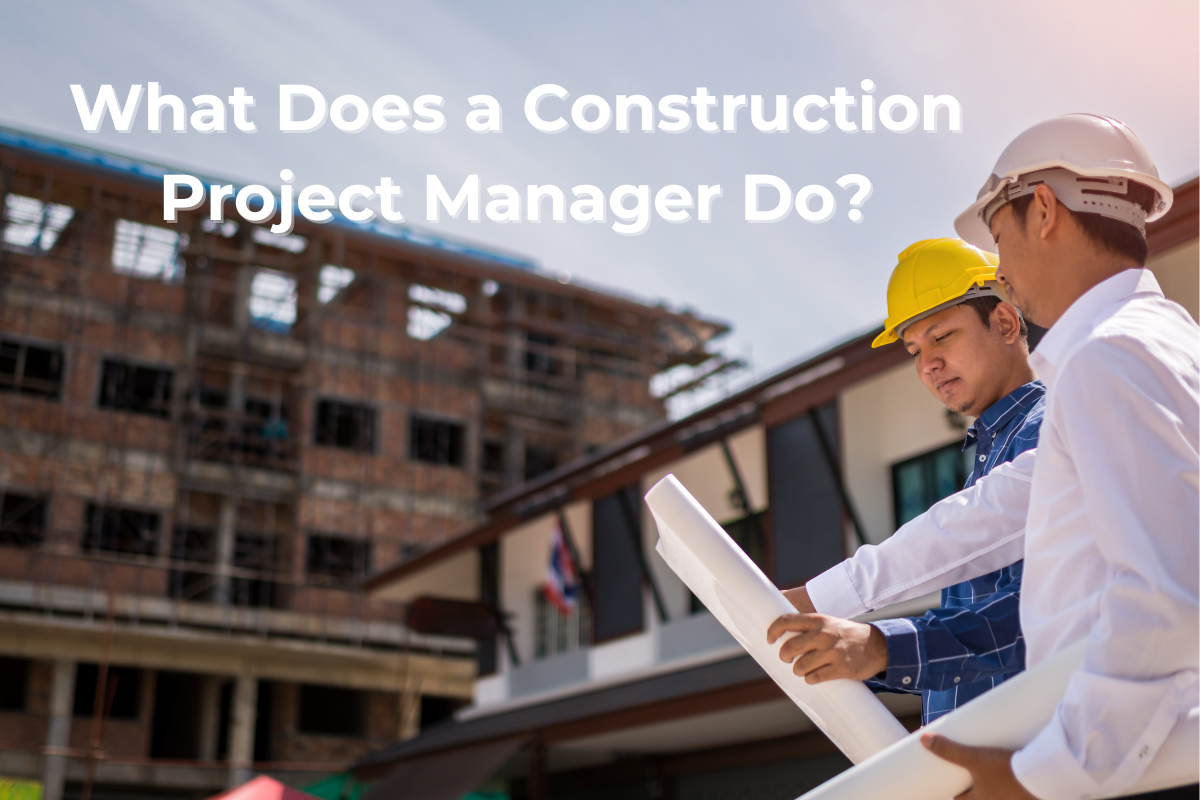
What Does a Construction Project Manager Do?
In the fast-paced world of construction, a successful project relies on the collaboration of various professionals and tradespeople. Among these, the construction project manager (PM) stands as the central figure ensuring that every piece of the puzzle falls into place. Whether it’s a simple home remodel or a large-scale commercial development, the construction PM is crucial to transforming blueprints into reality. But exactly what does a construction project manager do?
The Role of a Construction Project Manager
A simple description is, a construction project manager is essentially the point person who oversees a construction project from start to finish. They handle everything from planning and budgeting to coordinating teams and ensuring deadlines are met. Think of them as the “conductor” of an orchestra, ensuring all instruments (i.e., labor, materials, deadlines, etc.) are in harmony. This candidate must possess leadership skills to ensure a smooth project timeline. They also oversee construction projects from start to finish on any given platform.
Here are some key responsibilities that construction project managers are responsible for, especially when preparing work for the whole team:
1. Project Planning & Design Coordination of A Construction Project Manager
Before construction even begins, the project manager is involved in the planning phase that coordinates all building events. This stage can involve working with architects, designers, and engineers to ensure that the project is well-defined, the design is feasible, and any potential roadblocks are addressed. The project manager helps translate a client’s vision into a clear, actionable plan, setting goals, timelines, and budget expectations.
At this stage, a PM may help select subcontractors and vendors, coordinate procurement of materials, and ensure that all necessary permits are in place before breaking ground, as well as planning the construction project.
2. Managing the Budget
One of the most critical aspects of a construction project is managing the budget. From the very first estimation to the final bill, a project manager is tasked with keeping the project within financial limits. This responsibility includes estimating costs, managing purchases, securing materials, and ensuring that there are no unexpected overages.
The PM also works with clients to create detailed financial reports and regularly updates them on costs, ensuring transparency. By monitoring and adjusting to unforeseen changes (like rising material costs or unexpected site issues), the PM ensures that the project remains financially viable and also reaches it’s goals and perform company sales.
3. Scheduling and Time Management
In construction, time is money. The construction project manager is in charge of the project schedule, which means they need to coordinate the timing of tasks, deliveries, and workforces. If one part of the project gets delayed, it can have a domino effect on the entire timeline. Therefore, the PM’s job is to keep the project on track by ensuring milestones are met and work is completed within the scheduled timeframe.
In addition to managing deadlines, the PM’s role is to address any delays or challenges that arise, finding solutions that minimize downtime and keep things moving forward.
4. Team Coordination and Communication
A construction project involves numerous people, from contractors and subcontractors to suppliers, architects, and city inspectors. One of the PM’s primary responsibilities is ensuring effective communication among all involved parties.
The PM is the liaison between the client, subcontractors, construction workers, and other stakeholders. They hold meetings, send out updates, and make sure everyone is on the same page. Clear communication ensures that the project proceeds smoothly, reducing the risk of errors, misunderstandings, or duplication of efforts.
5. Problem-Solving and Risk Management
Construction projects rarely go according to plan. Unexpected issues—such as bad weather, material shortages, or regulatory concerns—often arise. The PM is the go-to person for problem-solving when these things happen. Their management role is to assess the situation, make informed decisions, and find solutions that minimize disruptions to the overall timeline.
A good Project Management Leader also anticipates potential risks before they arise, ensuring that there are contingency plans in place for things like accidents, labor shortages, or delays due to external factors.
6. Does A Construction Project Manager Perform Quality Control
Maintaining the quality of work is a top priority for the construction PM. They monitor the construction site regularly to ensure that work is being completed to the highest standards, as per the design and local building codes. This includes checking on the work of subcontractors, ensuring materials are up to spec, and coordinating inspections.
If any work does not meet quality standards, the PM must address it promptly, either by making adjustments to the current work or holding workers accountable. Ensuring quality isn’t just about meeting regulations—it’s also about maintaining the trust of the client.
7. Safety Management
Construction sites can be hazardous places, so ensuring safety is a priority. The construction project manager enforces safety protocols and ensures that workers are following proper procedures to prevent accidents. This includes conducting safety training, ensuring the use of protective equipment, proper tools, and making sure that the site is free of any safety hazards.
The PM is also responsible for ensuring that the construction site is compliant with all local, state, and federal safety regulations, such as OSHA standards. If an accident occurs, the PM must address it quickly, investigate the cause, and conduct corrective actions within the team, to prevent it from happening again.
8. Client Relationship Management
From the initial consultation to the final walk-through, the project manager is often the main point of contact for clients. This means maintaining a positive relationship, keeping clients informed, and addressing any concerns they have along the way. The PM acts as a representative of both the client and the construction team, ensuring that the project meets the client’s expectations.
Client satisfaction is a key metric of success in construction. The PM ensures that the client’s vision is executed properly while keeping them updated on progress and addressing any issues that arise throughout the project.
9. Finalizing and Project Handover
Once the construction project is completed, the PM’s job isn’t over. They are responsible for organizing final inspections, ensuring that the project is completed according to all specifications, and handling any punch-list items (minor tasks or fixes). They also ensure that all necessary documentation, such as warranties and operation manuals, is provided to the client.
The PM oversees the final handover to the client, ensuring that everything is ready and the project is fully functional. They may also follow up with the client after the project’s completion to ensure everything is running smoothly.
Conclusion
Construction project managers play a vital role in ensuring that projects are completed on time, within budget, and to the highest quality standards. They are the backbone of every successful construction project and overall construction industry, balancing multiple tasks and managing various moving parts to bring a client’s vision to life.
Whether you’re building a new home or tackling a large-scale commercial project, having an experienced and skilled project manager can make the difference between a smooth experience and a stressful one. If you’re considering a construction project, it’s worth investing in a professional project manager who can guide the project from start to finish, delivering outstanding results.

